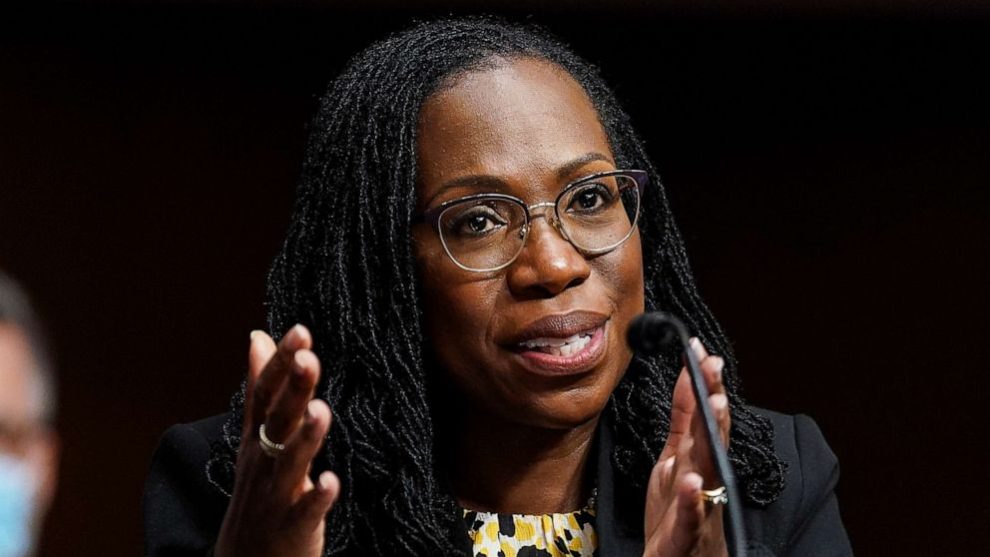Judge Ketanji Brown Jackson is an admirer of Critical Race Theory, the “1619 Project,” and Black Lives Matter, all of which hold beliefs about the United States and its laws that make it impossible for her to serve in good faith on the Supreme Court.
Her beliefs were revealed in a recently unearthed lecture delivered to the University of Michigan Law School — not as a young student, but as a sitting federal judge in 2020, confirmed a year later to the U.S. Court of Appeals for the D.C. Circuit.
Somehow Judge Jackson’s radical beliefs escaped close scrutiny in previous confirmations, but the Supreme Court defines the central principles of our republic, and its nominees invariably receive more careful attention, and quite deservedly so.
Moreover, Judge Jackson is the first Supreme Court nominee to be selected explicitly because of her race and gender. President Joe Biden declared that his first nominee would be a black woman, thereby invoking the kind of discrimination that the Supreme Court itself has said is unconstitutional.
There are pending cases about racial discrimination that Judge Jackson would hear as a Supreme Court justice, and therefore it is important to investigate her views on these topics closely.
The topic of Judge Jackson’s lecture in Michigan was certainly acceptable: “Black Women Leaders in the Civil Rights Movement Era and Beyond.”
The general thrust of her remarks, delivered in observance of Martin Luther King Jr. Day, was that black women have often led the fight for equal rights in the United States — the fight to ensure the nation was faithful to its founding principles. Through those black women, all other Americans became more free. That is certainly true.
What is alarming is that Judge Jackson cited Critical Race Theory, and its founder, Derrick Bell, as a source of inspiration. Bell’s basic thesis was that America is fundamentally racist, and that racism is enshrined in all of our institutions, since the Constitution was drafted at a time when black people could be owned as slaves.
To Bell, only the adoption of socioeconomic rights, through which the state would radically redistribute private wealth, could America be saved from systemic racism.
In his book Faces at the Bottom of the Well, which Judge Jackson said was omnipresent in her home as she grew up, Bell claimed that America is so racist that we would sell our black citizens to space aliens for gold to pay off our national debt.
Judge Jackson also cited the New York Times’ “1619 Project,” whose opening essay by Nikole Hannah-Jones falsely claimed that the American Revolution was fought to preserve slavery, making slavery the founding principle of the United States.
Furthermore, Judge Jackson said that her “favorite civil rights photograph of modern times” was that of a Black Lives Matter protester being arrested by police in Baton Rouge, Louisiana, in 2016, at a march to express outrage against the shootings, by police, of Alton Sterling and Philando Castile.
As striking as the image may be, the protest itself was misguided: both men were allegedly armed when they were shot. The Black Lives Matter movement would go on to devastate cities nationwide.
If these are Judge Jackson’s influences, she has no place on the Supreme Court. We cannot have a Justice who believes the Constitution is racist; who believes America was founded on slavery; or who believes police are guilty until proven innocent.
Judge Jackson’s confirmation is being treated as a foregone conclusion. But she cannot simply sail through the process: she must face specific questions about her beliefs.
Does she share Derrick Bell’s view that the Constitution is racist? Does she share the 1619 Project’s view on the American Revolution? Does she believe the officers who shot Sterling and Castile are guilty of murder? And — crucially — does she believe the race and gender criteria of her own nomination are acceptable?
These are not idle questions: they go directly to the question of whether Judge Jackson can be impartial on cases involving civil rights.
When President Donald Trump nominated prosecutor Ryan Bounds to the U.S. Court of Appeals for the Ninth Circuit in 2017, there were several Senators — including Republicans Marco Rubio (FL) and Tim Scott (SC) — who spoke out against Bounds’s writings as a college student, more than 20 years before. These essays, falsely described as “racist,” mocked identity politics and political correctness. Bounds apologized for using strident language; it was not enough to salvage his nomination.
Nothing he wrote comes anywhere close to the racial extremism of Judge Jackson’s role models.
There cannot be a double standard on civil rights. If a Republican nominee had to withdraw because of skepticism of racial politics as a student, a Democratic nominee with radical racial views in the present day should not be on the Supreme Court.
Story cited here.
























